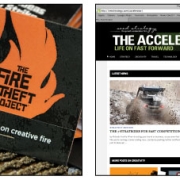Writing for the Reluctant Reader
13 tips to help your writing reach people… who don’t give a #&$! what you have to say.
Reading takes effort.
You gotta look at words. In sentences. You gotta re-read things. Your subconscious gets restless. And then… you begin to realize…
That YouTube video is just a click away.
We’ve all been there. Not because we’re lazy. Not because we’re jerks. But because there’s soooo much stuff out there, everyone has a filter now. Especially for written content—since it’s less efficient than other forms of media.
Granted, most of you aren’t “writers,” per se. But anyone reading this… writes. Presentations, proposals, articles, memos, emails. And, chances are, you’ve all had your intended audience flake out:
“Did you get a chance to read the presentation?”
“I, umm, glanced at it.”
So how do you bypass the filter? How do you keep their eyes on the page, first word to the last?
Here’s a few tips, tricks and tidbits I’ve learned over the years.

Think of writing as a “contract.”
Between you and the reader.
Writer: “Give me just one second of your time! I’ll make it worth it!”
Reader: “Yeah? I’m about half a second from watching this cat video. Better be good.”
Put yourself in their shoes. What would keep you from looking away?
To be fair, not everyone is gonna be a brick wall when it comes to words on a page. But—if you challenge yourself to write for that person—your prose will be sharper, clearer and capable of reaching anyone.

Hook ‘em.
We’ve all heard this one. But what is a “hook,” really?
It’s a sharp, curved thing that pokes you and makes you say “Holy $#@%!”
It’s something unexpected. Short. Quick. Visceral. Something that—initially—doesn’t appear to “fit.” It should go against the grain. Raise the proverbial eyebrow. So they lean in… and wonder what else you got goin’ on.

Write Like You Speak
When writing for any medium, it always helps to pay close attention to your sentence structure and to choose a style of diction that is both natural and forthcoming. This will ensure that readers remain engaged, while avoiding any potential confusion that may arise from less-than-ideal syntax.
Don’t write like that.
Write more like this. Write like you’re talking to someone. Conversation is natural. Personal. Have you ever talked to anyone in vapid, cumbersome shlocks of 12-pt Arial?
Nope.
Speak to your readers. They’ll appreciate it.

Complete sentences. Are for English teachers.
Because, like English class, they’re boring. Especially if they’re long. Fragments… on the other hand…
Quick. Simple. To the point. You don’t have to hold the beginning of the sentence in your head, as you read the rest of the sentence (like you just did on that sentence).
We speak in fragments. Very natural.
That’s not to say you should only write in fragments. That would be chaos. You need to find a balance. In fact, you need…

Rhythm.
All great prose has a poetic quality.
So does everything you write have to be a haiku? Of course not. But you should seek a syntaxual balance… of short sentences, fragments and long sentences.
Short sentences/fragments create “micro suspense.” Keeps the eye moving. Sets up tension. Foreshadows a release.
Longer sentences provide the cognitive “ahh” The crescendo that releases the tension you’ve built.Set up a narrative that builds. Cues an expectation. Then, when it feels right, throw in a long sentence that delivers on that sense of expectation.

Little words: there’s no strength in numbers.
This is an actual edit I made to the paragraph above—first sentence:
A. Set it up so it’s a narrative that builds.
B. Set up a narrative that builds.
Look at the string of itty-bitty words in example A—one, two and three letter words, all hunkered down together (they’ll do that). You have to stop, squint and pick it all apart.
Don’t do this. Don’t expect your readers to stop and squint. Because… they won’t. They’ll just stop.

Write in German.
English is the language of the “Anglo-Saxon” people… who came to Britain from Germany, in the 400s A.D. While the Romans built an edifice of Latin around the language, the soul of English remains German.
So write with soul.
Soul is, in fact, a very Germanic word—short, guttural, punchy. A word you feel, as much as know. Latin (and Greek) derivatives sound more pretentious and intellectual. And, at times… distracting.
[Latin] > [German]
Ambiance > Soul
Firmament > Sky
Obfuscate > Muddle
Strategy > Plot
Succession > String

Put the whites in their eyes.
White space is a good thing.
See?
Line breaks. One-line paragraphs. These are your friends. Don’t let a paragraph drag on. Three, four, five lines—that’s enough. Skip a line. And if you have a chunk of dense-looking text…
…break it up with some punchy one-liners.
Be creative with how you space and separate your text. It makes a real difference in how the eye moves down the page.
And it can play into your narrative rhythm.

Don’t let pronouns hang around.
Him, her, them, they, it.
Pronouns refer to people, places and things named elsewhere in your writing. But if pronouns get left hanging around by themselves…
It gets confusing.
They ended up being great ideas, full of excitement and creativity, and we really enjoyed working with them.
Ugh. What is “them” referring to? I have to go back and check… now I’ve lost touch. Off I go to YouTube.
If you must use a mid-sentence pronoun, keep it close to the thing you’re referring back to:
We really enjoyed working with these ideas—they were creative, exciting and just great all-around.

Don’t depend on dependencies.
That. Of. Which. With. In. Because. For. On. By. So.
Words like these suggest a dependent relationship between ideas.
If you use too many at once, the dependency chain gets confusing. This might seem obvious, but insanely long dependency chains can sneak up on you:
I wanted to get the rest of my vacation for the year on the calendar by the first of the month so I still have time to plan things for the summer.
I stopped reading at “on.” Again… would you speak like this to someone? No. Consider this:
I’ve got two weeks of vacation left this year. I wanted to get it on the calendar by the first… still need time to make plans.
Rule of Thumb: If your writing feels like it needs a diagram to be understood… it probably does.

Pass on passive voice. Sometimes.
Passive voice = is, was, are, were, be
These are the notorious “to be” verbs. They refer to things that will… be. With no sense of how, why, when, how much, how fast or how good.
They’re sort of like wildcards for “real” verbs. When you don’t have a verb that actually means something.
Thus, “to be” verbs CAN weaken the cohesion of your prose:
We acknowledge that a likely outcome is a combination of multiple strategic directions.
We acknowledge that our efforts may yield multiple strategic directions.
The verb yield makes a more specific connection to the noun efforts. Which makes the sentence clearer, sooner and with fewer words.
On the other hand…
For simple statements that don’t need specificity, passive voice is fine:
They were tired. Running all night. In pursuit of the freedom they’d been denied.
If you’re setting things up. Working in broad strokes. Don’t try to write around every “were,” “is” and “was.” It will sound… off.
Again, use conversation as a model. It’s fine to say, “This is X.”

Show us something. Don’t tell us about it.
Emotion is subjective. Abstract. It can’t be magically “contained” in a word.
Simply put: the word “terrifying” won’t make you feel “terrified.”
So if you wanna tug some heartstrings, don’t rely on adjectives to TELL your reader how to feel. Instead, trust nouns and verbs to SHOW your reader something… moving.
Observe:
TELLING (adjective/adverb driven) vs. SHOWING (noun/verb driven)
Depressing > Funeral
(You just visualized a funeral. Didn’t you? Depressing, huh?)
Elated > First Kiss
(Yep. You remember yours?)
Humiliated > Caught in the act
(It’s cool. Don’t tell us.)
He had a confident stride. > He swaggered on over to the bar.
(For some reason, I think of that movie Roadhouse. Like I said… subjective.)
She ran as fast as she possibly could. > She plunged down the stairs.
(You can see her taking the plunge, right?)
Utterly, intensely horrifying. > The place in the dark. Where the dead watch.
(What place? Where?? Why are they watching?!)
Show your reader something.
Things. Places. Actions. Events. Shirks. Sluffs. Skips. Crashes. Cascades. Whispers. Booms and blights. Jackhammers and Javelins.
They’ll have feelings about it. I promise.

Write for humans.
No one said writing was easy.
You toil over words. You hammer sentences into grammatical submission. You mind the details. You reconsider the point. You make it better. And sometimes… you still miss the mark.
But you have to remember one thing: your audience.
They’re human. They’re always human. They have preoccupations, passions and predilections. They’re not going to dissect your prose word-by-word; they’re not going to painstakingly reassemble your intended syntax in their heads.
That’s just not how people read. Unless they’re paid to.
From style, to voice, to rhythm, to timing… it’s the “intangibles” that turn words on a page into something that reaches off the page. And into the hearts of your readers.
Because, let’s face it: people want effect, without effort. And if your prose has the tenacity to sneak past their yawn filter… pretty soon, they’re not just “reading.” They’re seeing, feeling, learning, hearing and… experiencing.
So don’t give them something to read. Give them an experience.
Have some writerly advice of your own? Need some inspiration to get around a literary roadblock? Or maybe you just want trade word war stories? Connect with me on LinkedIn or comment below.
As a member of Seed’s copywriting team, Matt Donahue marries his love for creative writing with a keen interest in product innovation, technology and science. He’s a graduate of Seton Hill University’s “Popular Fiction” master’s program and writes whenever he can.
P.S. You can follow Seed Strategy on our LinkedIn, Twitter, Facebook and Instagram pages.









